定语从句英译汉之不同译
英汉翻译(10)定语从句的翻译
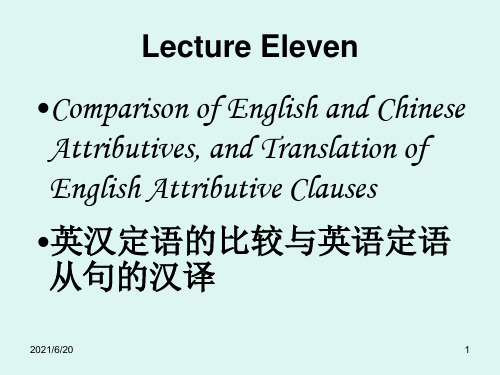
• The custom officer took up his suitcase, which was opened immediately in his presence.
• 海关官员拿起他的手提箱,并立即当着他的面打开。
• Trams, which disappeared from Britain many years, are still used in several European cities.
• A true friend is, as it were, a polished mirror which reflects our features, good and bad, as they are.
• 一个真正的朋友,就好象一面磨光的镜子,它把我们的 面貌,不论好的,坏的, 都如实地反映出来。
3)Translating Attributives with Adverbial Functions
• Rendered into a clause of cause • The strike would prevent the docking of
ocean steamships which require assistance of tugboats. • 罢工会使远洋轮船不能靠岸,因为它们需要拖国家不讨饭就活不下去。”
• There was that in Rawdon’s face which cuased Becky to fling herself before him.
• 罗登脸上的表情使得贝姬扑到他身前。
• They are aware that they are participating in a movement which is shaking the world and which brings together in its ranks, in its forward march, all peoples aspiring to freedom and justice.
定语从句翻译技巧

定语从句翻译技巧 Document number:WTWYT-WYWY-BTGTT-YTTYU-2018GT定语从句翻译技巧在英语中, 定语从句很常见, 翻译时如不进行仔细分析就会出现误译。
通过实例对定语从句的翻译技巧做一探讨, 并将这些翻译技巧赋予理论概念, 即定语从句定语化, 定语从句谓语化, 定语从句状语化。
在把汉语翻译成带有定语从句的英语时,中国学生常常会受到母语的影响会出现误译。
因此我们要对比英汉两种语言,以便避免汉语的负迁移。
一英译汉时定语从句翻译中的易错点英语中的定语从句是在句中起形容词作用的结构, 通常分为限制性定语从句和非限制性定语从句两大类。
进行英译汉翻译时如不进行仔细分析,就会造成误译。
比如,下面两个句子仅有一个逗号之差,含义却不同:His brother who is a soldier is eighteen years old now.His brother, who is a soldier, is eighteen years old now.第一句应译为:他那个当兵的哥哥今年十八岁了。
(含义为:他不止一个哥哥。
句中的限制性定语从句起到限定的作用。
)第二句应译为:他的哥哥今年十八岁了,他在当兵。
(含义为:他只有一个哥哥。
句中的非限制性定语从句起到补充说明的作用。
)定语从句在英语中大量出现, 它有长有短, 结构有简有繁, 对先行词的限制有强有弱, 定语从句有时起着补充说明和分层叙述的作用, 或在逻辑上表示原因、目的、条件, 让步和结果等意义。
在语序上, 英文定语从句置于先行词之后.。
所以汉译时必须正确体会原文的逻辑概念, 合理安排译文的语序。
二英译汉时定语从句的翻译方法英语定语从句虽然种类繁多, 变化复杂, 但一般均可以用以下三种方法翻译。
1 定语从句定语化限制性定语从句往往要译成前置定语结构, 翻译成带“的”的定语词组, 这是因为它与所修饰的词关系甚密, 若分开译会影响主句意思的完整。
论英语定语从句的几种翻译
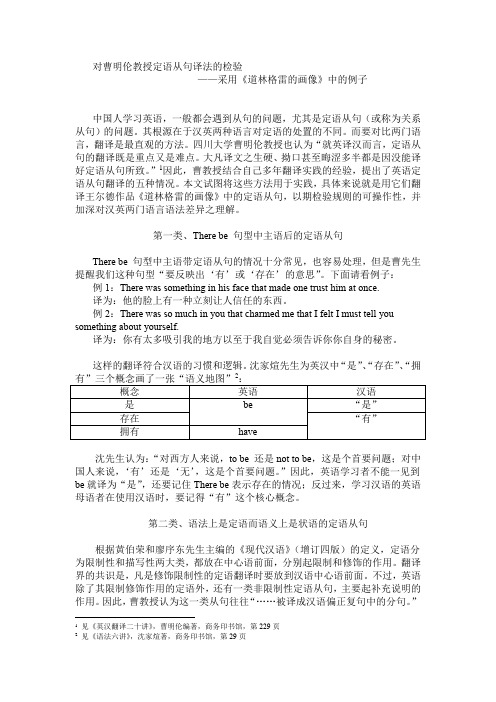
对曹明伦教授定语从句译法的检验——采用《道林格雷的画像》中的例子中国人学习英语,一般都会遇到从句的问题,尤其是定语从句(或称为关系从句)的问题。
其根源在于汉英两种语言对定语的处置的不同。
而要对比两门语言,翻译是最直观的方法。
四川大学曹明伦教授也认为“就英译汉而言,定语从句的翻译既是重点又是难点。
大凡译文之生硬、拗口甚至晦涩多半都是因没能译好定语从句所致。
”1因此,曹教授结合自己多年翻译实践的经验,提出了英语定语从句翻译的五种情况。
本文试图将这些方法用于实践,具体来说就是用它们翻译王尔德作品《道林格雷的画像》中的定语从句,以期检验规则的可操作性,并加深对汉英两门语言语法差异之理解。
第一类、There be 句型中主语后的定语从句There be 句型中主语带定语从句的情况十分常见,也容易处理,但是曹先生提醒我们这种句型“要反映出‘有’或‘存在’的意思”。
下面请看例子:例1:There was something in his face that made one trust him at once.译为:他的脸上有一种立刻让人信任的东西。
例2:There was so much in you that charmed me that I felt I must tell you something about yourself.译为:你有太多吸引我的地方以至于我自觉必须告诉你你自身的秘密。
这样的翻译符合汉语的习惯和逻辑。
沈家煊先生为英汉中“是”、“存在”、“拥2沈先生认为:“对西方人来说,to be 还是not to be,这是个首要问题;对中国人来说,‘有’还是‘无’,这是个首要问题。
”因此,英语学习者不能一见到be就译为“是”,还要记住There be表示存在的情况;反过来,学习汉语的英语母语者在使用汉语时,要记得“有”这个核心概念。
第二类、语法上是定语而语义上是状语的定语从句根据黄伯荣和廖序东先生主编的《现代汉语》(增订四版)的定义,定语分为限制性和描写性两大类,都放在中心语前面,分别起限制和修饰的作用。
定语从句的翻译

friendship is of long standing. ▪ 我们两国是友谊长存的有好邻邦。 ▪ The people who worked for him lived in mortal
rashly attempt to cross the pass on foot. ▪ 尽管新建了隧道,有些旅行者还是企图步行穿过山口。
▪ There seems to be someone who wants to go with you. ▪ 好像有人想跟你去。 ▪ There happened to be a student who was able to work
▪ 定俗成式定语从句是指一种it...that...的句式,这 种含约定俗成式定语从句的复合句的意思实际上 相当于一个让步状语从句。如It is a wise mother that knows her own daughter.(再聪慧的母亲也不 见得了解自己的女儿。) 原句相当于一个状语从 句No matter how wise a mother is, she may not know her own daughter.翻译此类定语从句应该 用溶合法,即将主句和从句溶合在一起翻译。例 如:
▪ 液态水变为蒸汽,这就叫做蒸发
常用的定语从句的翻译方法
▪ 一、合译法
▪ 合译法通常用于句式较短的情况,主要以 限制性定语从句为主。在英译汉时,一般 将其译成“的”字结构,有时也将定语部 分译成谓语、兼语句的一部分或带有“这” 字句的简单句。
定语从句英译汉之不同译

• 定语从句后置,省略关系词所代表的含义: • After dinner, the four key negotiators resumed their talks,which continued well into the night。 • 饭后,四个主要谈判人物继续进行会 谈, 一直谈到深夜。
用定语从句翻译各句
• 1. 学生们对学校饭堂的饭菜抱怨很多,他们在里面发现 过头发。 • 2. 他们和校长谈了,校长向他们保证会认真考虑他们的 建议。 • 3. 以前我数学不好,我朋友每天都花时间帮助我。 • 4. 尽管他在车祸中失去了一条腿,可他并没有气馁,而 是以常人想象不到的毅力,在奥运会上夺得了金牌。 • 5. 以前人们都认为地球是平的,而不是圆的,现在证明 是错误的。 • 6. 在学校住宿既可以节省时间来学习,又能有时间跟同 学分享集体生活的快乐。 • 7. 政府比个人更能够有效地阻止公共场所吸烟,应当尽 快采取措施为市民营造干净、和谐的生活环境。
• 在定语复合句中,将英语主句压缩成汉 语词组做主语,而把定语从句译成谓语, 溶合成一个句子: • This is a nation that must beg to stay alive。 • 这个国家不讨饭就活不下去。
• 二、非限制性定语从句 • 前置法 • 一些较短而具有描写性的英语非限 制性定语从句,可译成带“的”的前置 定语: • The sun, which had hidden all day, now came out in all its splendour。 • 那个整天躲在云层里的太阳,现在 又光芒四射地露面了。
• 4。译成表“目的”的分句 • I have not given up my efforts to get a passport that will enable me to visit that country。 • 我没有放弃努力来争取一张护照, 以便到那个国家去访问。
定语从句的翻译

翻译此类定语从句应该用溶合法,即将主句和从 句溶合在一起翻译。例如: It is a good machine that can work without power. 再好的机器也要有动力才能开动。
It is a long lane that has no turning. 再长的巷子也会有转弯的。
1、译成“这”字句
有时,关系代词并不仅仅只是指代先行词,它还指代 前面整个句子的内容。这时,我们一般将其译成“这” 或“这一点” He admired Mrs. Brown, which surprises me most. 他钦佩布朗太太,这使我大为惊讶。 She was very patient towards the children, which her husband seldom was. 她对孩子们很耐心,她丈夫却很少这样。
常用的定语从句的翻译方法
一、合译法
合译法通常用于句式较短的情况,主要以 限制性定语从句为主。 在英译汉时,一般将其译成“的”字结构, 有时也将定语部分译成谓语、兼语句的一 部分或带有“这”字句的简单句。
1.译成定语“的”字结构
最为常见,将定语部分放在被修饰名词的前面 He is not the one who will give up easily. 他不是一个轻易服输的人。
3. This is the cat that killed the rat that ate the cake. 这就是那只捕杀了老鼠的猫。老鼠偷吃了蛋糕。 4. This is the cat that killed the rat that ate the cake that was put in the house. 这就是那只捕杀了老鼠的猫。老鼠偷吃了放在屋里的蛋糕。 5. This is the cat that killed the rat that ate the cake that was put in the house that Jack built. 这就是那只捕杀了老鼠的猫。老鼠偷吃了放在屋里的蛋糕。屋子 是杰克盖的。
定语从句的翻译方法
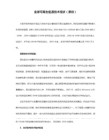
另外,有些定语从句英译汉时要需要将主句压缩成主语,而将定语从句译成谓语,融合为一个句子。
另外,在英语中常常会把需要强调的内容放于句首,而汉语中却习惯把附加性说明的定语部分翻译成后置型的并列分句,以求在形式上突出主句的内容。
例1: She suddenly thought of her husband, who had left her and their children behind and had never been heard of. 译文:他丈夫早就抛弃了妻儿一直杳无音信,现在她突然想起了他。
2.译成谓语 当定语从句是存在句,尤其是在“there be结构”和它的变体结构、以及在“it be +主语+定语从句”的结构中,定语从句的谓语在意义上也是整个主句的谓语,因此在英译汉时可将其译为主谓结构的简单句。
例1:There were men in that crowd who had stood there every day for a month.译文:在那群人中,有的人每天都站在那里,站了一个月。
例1:He took out a bottle of wine out of his pocket, which he began to drink slowly.译文:他从衣兜里掏出一瓶酒慢慢地喝起来。
例2: We will send the boy to Britain, where he can receive better education.译文:我们将要把这个孩子送到英国去接受更好的教育。
定语从句汉译英翻译

定语从句句型练习1.正在和汤姆说话的人是约翰。
2.你正在找的那位医生在房间里。
4.这是你想要的那本书。
5.我不能忘记在北京居住的那些日子。
6.这是我住了5年的房子。
7.这就是我为什么迟到的原因。
9.正在树下读书的那个女骇是我妹妹。
10.玛莉正在照看的那个小骇是汤姆。
12.这是我为什么不喜欢他的原因。
13.你认识那个叫做汤姆的人吗?16.我想见一见你刚才谈起的人。
17.一周前丢失的那只山羊找到了。
21.你知道电影的开始时间吗?23.昨晚我们看的那场电影太好了。
1.The boy who is talking with Tom is John.2.The doctor whom you are looking for is in the room .4.This is the book which you want .5.I can’t forget the days when I lived in Beijing .6.This is the house where I lived for five years .7.This is (the rea son) why I’m late .9.The girl who is reading under the tree is my sister .10.The boy whom Mary is looking after is Tom .12.This is (the reason) why I don’t like him .13.Do you know the man whose name is Tom .16.I want to see the man whom you talked of just now .17.The goat which was lost a week ago has been found .20.This is the only thing that we can do .21.Do you know the time when the film will begin ?23.The film which we saw yesterday evening was wonderful .。
《定语从句》的翻译方法
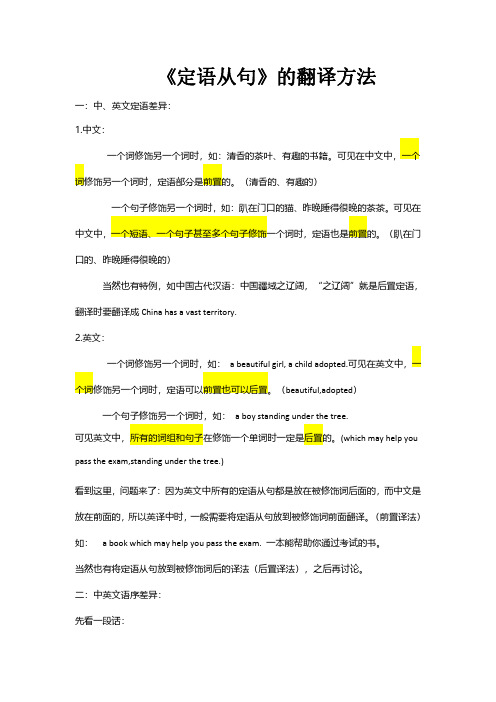
《定语从句》的翻译方法一:中、英文定语差异:1.中文:一个词修饰另一个词时,如:清香的茶叶、有趣的书籍。
可见在中文中,一个词修饰另一个词时,定语部分是前置的。
(清香的、有趣的)一个句子修饰另一个词时,如:趴在门口的猫、昨晚睡得很晚的茶茶。
可见在中文中,一个短语、一个句子甚至多个句子修饰一个词时,定语也是前置的。
(趴在门口的、昨晚睡得很晚的)当然也有特例,如中国古代汉语:中国疆域之辽阔,“之辽阔”就是后置定语,翻译时要翻译成China has a vast territory.2.英文:一个词修饰另一个词时,如:a beautiful girl,a child adopted.可见在英文中,一个词修饰另一个词时,定语可以前置也可以后置。
(beautiful,adopted)一个句子修饰另一个词时,如:a boy standing under the tree.可见英文中,所有的词组和句子在修饰一个单词时一定是后置的。
(which may help you pass the exam,standing under the tree.)看到这里,问题来了:因为英文中所有的定语从句都是放在被修饰词后面的,而中文是放在前面的,所以英译中时,一般需要将定语从句放到被修饰词前面翻译。
(前置译法)如:a book which may help you pass the exam.一本能帮助你通过考试的书。
当然也有将定语从句放到被修饰词后的译法(后置译法),之后再讨论。
二:中英文语序差异:先看一段话:中国作为一个发展中的大国高度重视中美两国之间的友谊。
翻译1:China is a major developing country and attaches great importance to the bilateral relations between China and the U.S.翻译2:As a major developing country,China attaches great importance to the bilateral relations between China and the U.S.这两种翻译看上去都是对的,因为两种都不影响理解。
定语从句的英语翻译方法
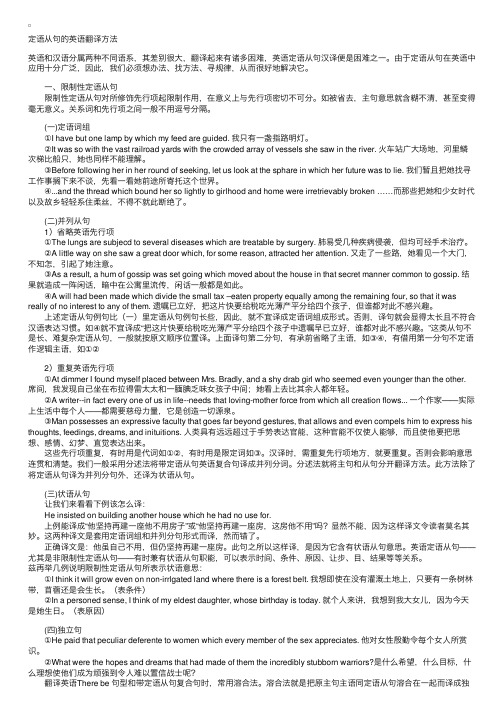
定语从句的英语翻译⽅法英语和汉语分属两种不同语系,其差别很⼤,翻译起来有诸多困难,英语定语从句汉译便是困难之⼀。
由于定语从句在英语中应⽤⼗分⼴泛,因此,我们必须想办法、找⽅法、寻规律,从⽽很好地解决它。
⼀、限制性定语从句 限制性定语从句对所修饰先⾏项起限制作⽤,在意义上与先⾏项密切不可分。
如被省去,主句意思就含糊不清,甚⾄变得毫⽆意义。
关系词和先⾏项之间⼀般不⽤逗号分隔。
(⼀)定语词组 ①I have but one lamp by which my feed are guided. 我只有⼀盏指路明灯。
②It was so with the vast railroad yards with the crowded array of vessels she saw in the river. ⽕车站⼴⼤场地,河⾥鳞次梯⽐船只,她也同样不能理解。
③Before following her in her round of seeking, let us look at the sphare in which her future was to lie. 我们暂且把她找寻⼯作事搁下来不谈,先看⼀看她前途所寄托这个世界。
④...and the thread which bound her so lightly to girlhood and home were irretrievably broken ……⽽那些把她和少⼥时代以及故乡轻轻系住柔丝,不得不就此断绝了。
(⼆)并列从句 1)省略英语先⾏项 ①The lungs are subjecd to several diseases which are treatable by surgery. 肺易受⼏种疾病侵袭,但均可经⼿术治疗。
②A little way on she saw a great door which, for some reason, attracted her attention. ⼜⾛了⼀些路,她看见⼀个⼤门,不知怎,引起了她注意。
定语从句的翻译(部分)

1. 译成定语“的”字结构
Nations will usually produce and export those goods in which they have the greatest comparative advantage, and import those items in which they have the least comparative advantage. 各国通常都生产和出口那些最具有比较优势的产品,而 进口那些最不具有比较优势的产品。 p. 95
2.译成谓语
翻译此类定语从句应该用溶合法,即将主句和从句溶合 在一起翻译。例如: It is a good machine that can work without power. 再好的机器也要有动力才能开动。 It is a long lane that has no turning. 再长的巷子也会有转弯的。
4. 译成连动式的一部分
为了行文方便,需要把主句、从句中的动词连起来一起翻 译,从而使句子显得连贯,符合汉语的表达习惯。 He took out a bottle of wine out of his pocket, which he began to drink slowly. 他从衣兜里掏出一瓶酒慢慢地喝起来。 We will send the boy to Britain, where he can receive better education. 我们将要把这个孩子送到英国去接受更好的教育。
英语定语从句的汉译
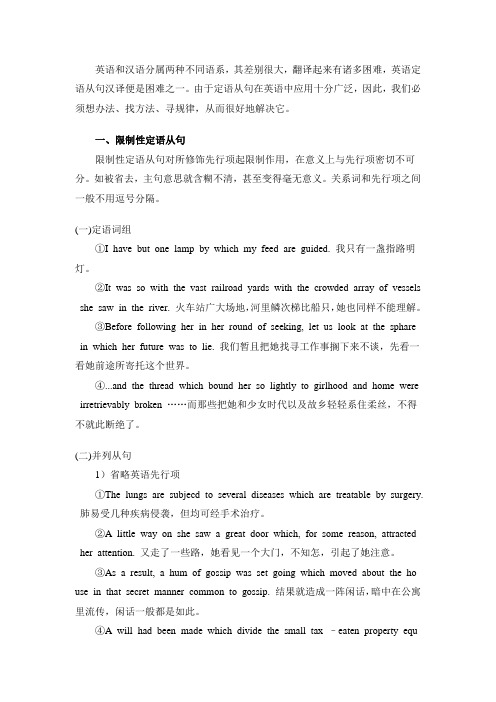
英语和汉语分属两种不同语系,其差别很大,翻译起来有诸多困难,英语定语从句汉译便是困难之一。
由于定语从句在英语中应用十分广泛,因此,我们必须想办法、找方法、寻规律,从而很好地解决它。
一、限制性定语从句限制性定语从句对所修饰先行项起限制作用,在意义上与先行项密切不可分。
如被省去,主句意思就含糊不清,甚至变得毫无意义。
关系词和先行项之间一般不用逗号分隔。
(一)定语词组①I have but one lamp by which my feed are guided. 我只有一盏指路明灯。
②It was so with the vast railroad yards with the crowded array of vessels she saw in the river. 火车站广大场地,河里鳞次梯比船只,她也同样不能理解。
③Before following her in her round of seeking, let us look at the sphare in which her future was to lie. 我们暂且把她找寻工作事搁下来不谈,先看一看她前途所寄托这个世界。
④...and the thread which bound her so lightly to girlhood and home were irretrievably broken ……而那些把她和少女时代以及故乡轻轻系住柔丝,不得不就此断绝了。
(二)并列从句1)省略英语先行项①The lungs are subjecd to several diseases which are treatable by surgery.肺易受几种疾病侵袭,但均可经手术治疗。
②A little way on she saw a great door which, for some reason, attracted her attention. 又走了一些路,她看见一个大门,不知怎,引起了她注意。
定语从句的翻译
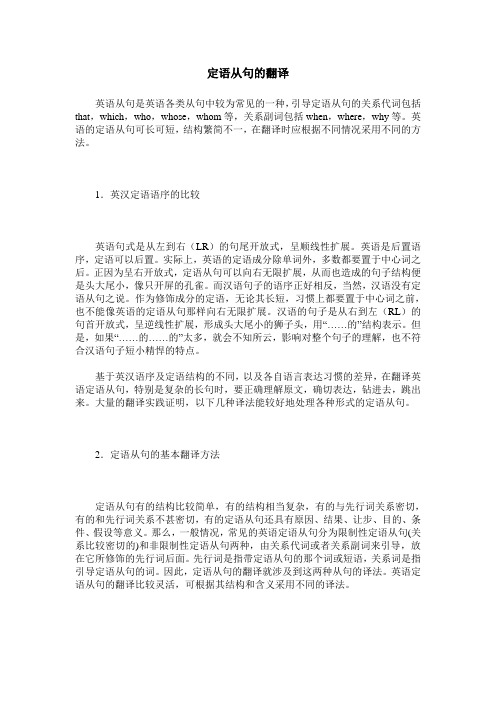
定语从句的翻译英语从句是英语各类从句中较为常见的一种,引导定语从句的关系代词包括that,which,who,whose,whom等,关系副词包括when,where,why等。
英语的定语从句可长可短,结构繁简不一,在翻译时应根据不同情况采用不同的方法。
1.英汉定语语序的比较英语句式是从左到右(LR)的句尾开放式,呈顺线性扩展。
英语是后置语序,定语可以后置。
实际上,英语的定语成分除单词外,多数都要置于中心词之后。
正因为呈右开放式,定语从句可以向右无限扩展,从而也造成的句子结构便是头大尾小,像只开屏的孔雀。
而汉语句子的语序正好相反,当然,汉语没有定语从句之说。
作为修饰成分的定语,无论其长短,习惯上都要置于中心词之前,也不能像英语的定语从句那样向右无限扩展。
汉语的句子是从右到左(RL)的句首开放式,呈逆线性扩展,形成头大尾小的狮子头,用“……的”结构表示。
但是,如果“……的……的”太多,就会不知所云,影响对整个句子的理解,也不符合汉语句子短小精悍的特点。
基于英汉语序及定语结构的不同,以及各自语言表达习惯的差异,在翻译英语定语从句,特别是复杂的长句时,要正确理解原文,确切表达,钻进去,跳出来。
大量的翻译实践证明,以下几种译法能较好地处理各种形式的定语从句。
2.定语从句的基本翻译方法定语从句有的结构比较简单,有的结构相当复杂,有的与先行词关系密切,有的和先行词关系不甚密切,有的定语从句还具有原因、结果、让步、目的、条件、假设等意义。
那么,一般情况,常见的英语定语从句分为限制性定语从句(关系比较密切的)和非限制性定语从句两种,由关系代词或者关系副词来引导,放在它所修饰的先行词后面。
先行词是指带定语从句的那个词或短语,关系词是指引导定语从句的词。
因此,定语从句的翻译就涉及到这两种从句的译法。
英语定语从句的翻译比较灵活,可根据其结构和含义采用不同的译法。
(1) 逆序合并法在定语从句句式较短的情况下(一般在10词以内),翻译时,不按原文的顺序而把置于后面的定语从句译到前面,合并于主句中译成“……的”结构,使译文结构更为紧凑,语意更为连贯。
英语定语从句的翻译(原创)
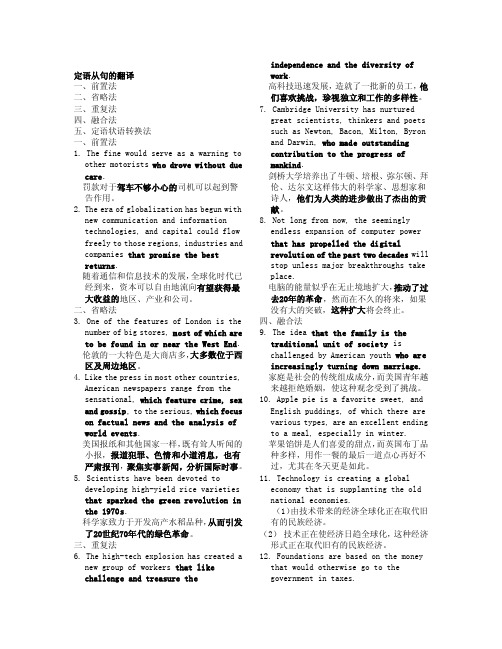
定语从句的翻译一、前置法二、省略法三、重复法四、融合法五、定语状语转换法一、前置法1. The fine would serve as a warning toother motorists who drove without due care.罚款对于驾车不够小心的司机可以起到警告作用。
2. The era of globalization has begun withnew communication and informationtechnologies, and capital could flow freely to those regions, industries and companies that promise the bestreturns.随着通信和信息技术的发展,全球化时代已经到来,资本可以自由地流向有望获得最大收益的地区、产业和公司。
二、省略法3. One of the features of London is thenumber of big stores, most of which are to be found in or near the West End.伦敦的一大特色是大商店多,大多数位于西区及周边地区。
4. Like the press in most other countries,American newspapers range from thesensational, which feature crime, sex and gossip, to the serious, which focus on factual news and the analysis ofworld events.美国报纸和其他国家一样,既有耸人听闻的小报,报道犯罪、色情和小道消息,也有严肃报刊,聚焦实事新闻,分析国际时事。
5. Scientists have been devoted todeveloping high-yield rice varieties that sparked the green revolution in the 1970s.科学家致力于开发高产水稻品种,从而引发了20世纪70年代的绿色革命。
考研英语英译汉难句分类辨析之定语从句
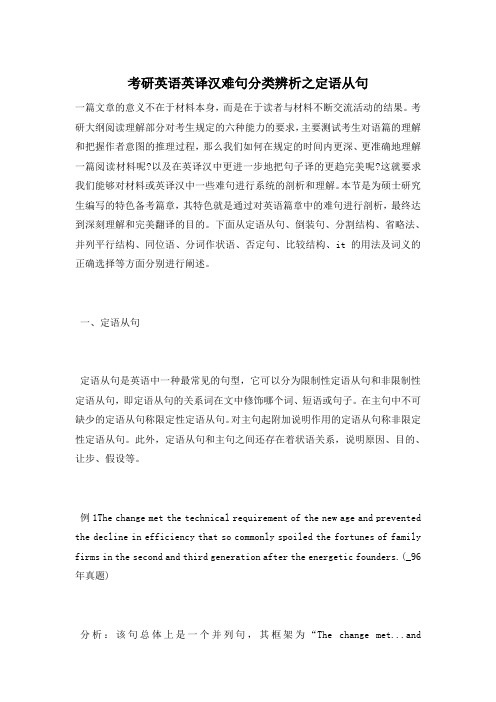
考研英语英译汉难句分类辨析之定语从句一篇文章的意义不在于材料本身,而是在于读者与材料不断交流活动的结果。
考研大纲阅读理解部分对考生规定的六种能力的要求,主要测试考生对语篇的理解和把握作者意图的推理过程,那么我们如何在规定的时间内更深、更准确地理解一篇阅读材料呢?以及在英译汉中更进一步地把句子译的更趋完美呢?这就要求我们能够对材料或英译汉中一些难句进行系统的剖析和理解。
本节是为硕士研究生编写的特色备考篇章,其特色就是通过对英语篇章中的难句进行剖析,最终达到深刻理解和完美翻译的目的。
下面从定语从句、倒装句、分割结构、省略法、并列平行结构、同位语、分词作状语、否定句、比较结构、it的用法及词义的正确选择等方面分别进行阐述。
一、定语从句定语从句是英语中一种最常见的句型,它可以分为限制性定语从句和非限制性定语从句,即定语从句的关系词在文中修饰哪个词、短语或句子。
在主句中不可缺少的定语从句称限定性定语从句。
对主句起附加说明作用的定语从句称非限定性定语从句。
此外,定语从句和主句之间还存在着状语关系,说明原因、目的、让步、假设等。
例1The change met the technical requirement of the new age and prevented the decline in efficiency that so commonly spoiled the fortunes of family firms in the second and third generation after the energetic founders.(_96年真题)分析:该句总体上是一个并列句,其框架为“The cha nge met...andprev ented”“that”后边引导的是一定语从句,作后置定语,修饰“the decline in efficiency”。
介词短语“in the second and third generation”,“after the energetic founders”又作为定语从句中“spoiled”的状语。
论定语从句的英汉互译

2302018年52期总第440期ENGLISH ON CAMPUS论定语从句的英汉互译文/刘永华【摘要】英汉两种语言的基本语序是一致的,但是定语的位置区别很大。
在翻译定语从句时,无论是汉译英还是英译汉,都要格外注意语序的调整。
做汉英翻译时,应注意把汉语的定语调整到名词的后面。
做英汉翻译时,根据句子的功能及内在逻辑,定语从句的翻译应具体问题具体分析。
【关键词】语序;定语从句;英汉互译【作者简介】刘永华(1986-),女,汉族,河南商丘人,硕士,商丘学院外国语学院讲师,研究方向:翻译理论与实践。
that was Mr. Robert.有一个人似乎胸有成竹,那就是罗伯特先生。
4.译成原因、结果、让步、目的、条件状语从句。
The thief who was about to escape was caught by the police.小偷要跑时,被警察抓住了。
(时间状语从句)We support the open trade system which is to the ultimateadvantage of all.我们支持开放的贸易制度,(因为)它最终对大家都有好处。
(原因状语从句)There are something original, independent, and heroic about the plan that please them all. 这个方案富于创造性,独出心裁,很有魄力,所以使所有人都很喜欢它。
(结果状语从句)Those who are in favour please hold up their hands.(凡)赞成的,请举手。
(条件、假设状语从句)She was very patient towards the children, which her husband seldom was.她对孩子们很有耐心,而她丈夫却很少这样。
(转折状语从句)三、结语从以上分析中,我们能很清晰直观的看出对于定语从句的翻译,汉译英时应注意把定语从句调整到中心词的后面,英译汉时,应根据句子功能及内在的语义逻辑,选择灵活的翻译策略。
- 1、下载文档前请自行甄别文档内容的完整性,平台不提供额外的编辑、内容补充、找答案等附加服务。
- 2、"仅部分预览"的文档,不可在线预览部分如存在完整性等问题,可反馈申请退款(可完整预览的文档不适用该条件!)。
- 3、如文档侵犯您的权益,请联系客服反馈,我们会尽快为您处理(人工客服工作时间:9:00-18:30)。
用定语从句翻译各句
• 1. 学生们对学校饭堂的饭菜抱怨很多,他们在里面发现 过头发。
• 2. 他们和校长谈了,校长向他们保证会认真考虑他们的 建议。
• 3. 以前我数学不好,我朋友每天都花时间帮助我。
• 4. 尽管他在车祸中失去了一条腿,可他并没有气馁,而 是以常人想象不到的毅力,在奥运会上夺得了金牌。
• 5. 以前人们都认为地球是平的,而不是圆的,现在证明 是错误的。
• 6. 在学校住宿既可以节省时间来学习,又能有时间跟同 学分享集体生活的快乐。
• 7. 政府比个人更能够有效地阻止公共场所吸烟,应当尽 快采取措施为市民营造干净、和谐的生活环境。
• 1. Students, who have seen hair in the food served in the school canteen, complain a lot about it.
• He would be a short –sighted commander who did not look beyond his fortress。
• 谁如果不往城堡之外的远处看,那 他就是一个目光短浅的指挥员。
• He who has never been to the Great Wall is not a true man.
• 我没有放弃努力来争取一张护照, 以便到那个国家去访问。
• 5。译成表“条件”、“假设”的分句
• Men become desperate for work, any work which will help them to keep alive their families。
• 人们极其迫切要求工作,不管什么 工作,只要它能维持一家人的生活就行。
一试身手
• 辩论赛发言稿: • 主题:青少年追捧流行歌星有必要吗? • 要点:
1)说明青少年追捧流行音乐的目 的和表现方式
2)你如何看待这个问题?
• 主题:如何减少交通事故
• 要点:1)交通事故造成的损失;
2)人们应做出什么努力来减 少交通事故的发生;
3)政府应采取什么措施来减 少交通事故的发生。
• 3. There was a time when I was not good at math and my friends spent time helping me every day.
• OR: I was not good at math before, with which my friends helped me every day.
• 是他接到那封信,说你的叔叔去世 了。
• 3。溶合法
• 1)溶合法是指把原句中的主语和定语从句 溶合到一起译成一个独立的句子的翻译方法。 它较适用于翻译限制性定语从句,如“There be…”结构形式;
• There are many people who want to see film。
• 许多人要看这部电影。
• There is a man downstairs who wants to see you 。
• 楼下有人要见你。
• 在定语复合句中,将英语主句压缩成汉 语词组做主语,而把定语从句译成谓语, 溶合成一个句子:
• This is a nation that must beg to stay alive。
• 饭后,四个主要谈判人物继续进行会 谈, 一直谈到深夜。
• 定语从句前置,重复关系词所代表的含 义:
• World War ll was, however, more complex than World War l,which was a collision among the imperialist powers over the spoils of markets, resources and territories。
• 我们知道由于猫的眼睛比我们人的眼睛吸收 更多的光线,所以猫在黑夜也能看很清楚。
• 译成表“果”分句
• There was something original, independent, and heroic about the plan that pleased all of them。
• 这个方案富于创造性,独出心裁, 很有魄力,所以使他们都喜欢。
• He liked his sister, who was warm and
pleasant, but he did not like his brother, who was cold and arrogant。
• 他喜欢热情愉快的妹妹,而不喜欢 冷漠高傲的哥哥。
• 2。后置法 • 1)译成并列分句 • 定语从句后置,重复英语关系词所
• 三。兼有状语特点的定语从句
• 有的定语从句,意义上有状语特点,说明原 因、结果、目的、让步、假设等关系,可相应地 译成状语从句。
• 译成表“因”分句
• We know that a cat, whose eyes can take in many rays of light than our eyes, can see clearly at night。
• 第一次世界大战是帝国主义列强之 间争夺市场、资源和领土的冲突是,而 第二次世界战却比第一次复杂。
• 2)译成独立句
• One was a violent thunderstorm, the worst I had ever seen, which obscured my objective。
• 有一次是暴风骤雨,猛烈的程度实 为我生平所仅见。这阵暴风雨遮住了我 的目标。
• 1) 译成并列分句,重复英语先行词:
• They are struggling for the ideal which is close to the heart of every Chinese and for which, in the past, many Chinese have laid down their lives。
• 5. There was a time when people thought the earth was flat, instead of round, which now proves not true.
• 6. Boarding at school, by which students save a lot of time for their study, enables them to share the joy of spending time together.
• 3。译成表“让步”的分句
• He insisted on building another house, which he had no use for。
• 他坚持要再造一栋房子,尽管他并 无此需要。
• 4。译成表“目的”的分句
• I have not given up my efforts to get a passport that will enable me to visit that country。
代表的含义:
• I told the story to John, who told it to his brother。
• 我把这件事告诉了约翰,约翰又告 诉了他的弟弟。
• 定语从句后置,省略关系词所代表的含义:
• After dinner, the four key negotiators resumed their talks,which continued well into the night。
• 4. He, who lost a leg in the accident, did not lose heart but won a gold medal in the Olympics with the determination and willpower that is unimaginable for able-bodied people.
• 这制性定语从句
• 前置法
• 一些较短而具有描写性的英语非限 制性定语从句,可译成带“的”的前置 定语:
• The sun, which had hidden all day, now came out in all its splendour。
• 那个整天躲在云层里的太阳,现在 又光芒四射地露面了。
• 7. The government, who can more effectively stop people smoking in public than individuals, should take measures as soon as possible to create for citizens a clean and harmonious living environment.
定语从句英译汉之不同译法
• 一、限制性定语从句 • 1. 前置法
• 译成带“的”的定语词组,放在被 修饰词之前,变为单句:
• The people who worked for him lived in fear of him。
• 在他手下工作的人对他怕得要死。
• 2. 后置法
• 如果从句结构复杂,译成汉语前置定语显得 太长而不符合汉语表达习惯时,往往译成后置的 并列分句。
• OR: Students complain a lot about food cooked in the school canteen, in which they have seen hair.
• 2. They talked to the headmaster, who promised to them that he would take their suggestions seriously.
